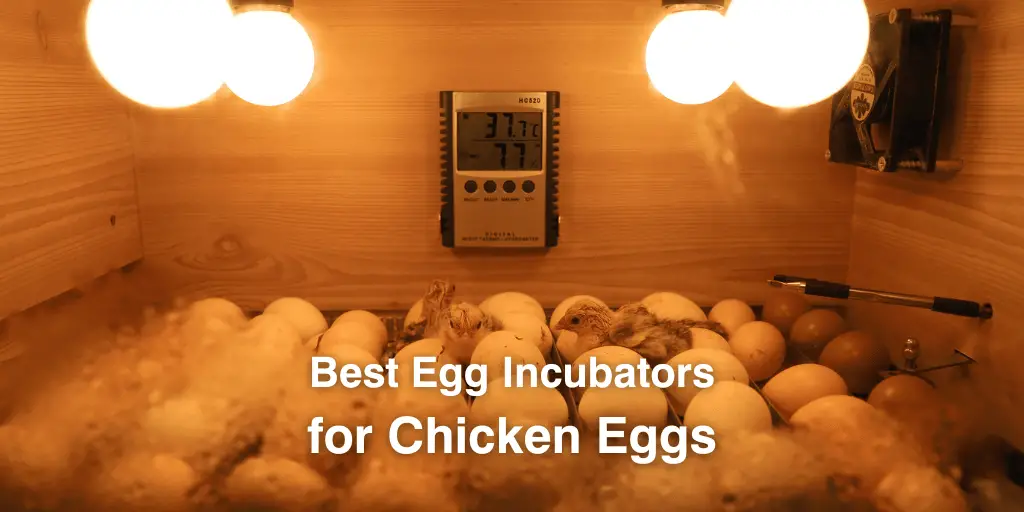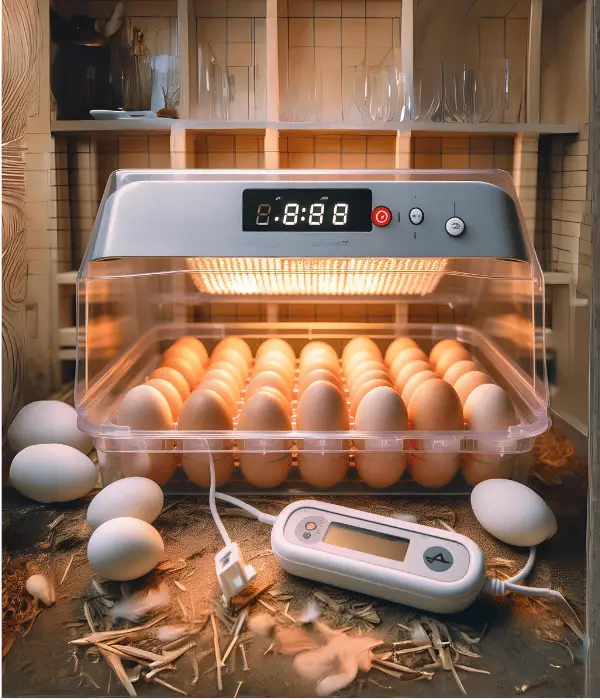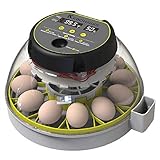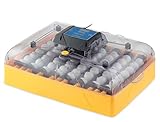
Are you searching for one of the best egg incubators for chicken eggs? If yes, this guide will help you choose one from the top in the market.
The best egg incubators improve egg hatching and chick development. The proper setup of temperature, humidity, and ventilation in the incubator causes this.
Egg turning and species-specific incubation are crucial during the process. Monitor embryo growth in an incubator to optimize species-specific time.
Airflow is essential for embryo growth, and incubators assist in maintaining it.
Many modern incubators incorporate automatic egg turning to replicate the natural process and prevent embryos from sticking to inner eggshells.
Poultry farmers must hatch eggs in a reliable incubator. Farmers raising pet chickens can use incubators because pet chickens rarely go broody.
Best 3 Recommended Egg Incubators For Chicken Eggs
Last update on 2024-07-13 / Affiliate links / Images from Amazon Product Advertising API
Best 10 Egg Incubators for Chicken Eggs
Here is the list of best egg incubators for hatching chicken eggs-
1. KEBONNIXS 12 Egg Incubator For Hatching 12 Chicken Eggs
- ★【STABLE TEMPERATURE】- Induced airflow system...
- ★【DISPLAY HUMIDITY LEVEL】- No need to buy...
- ★【BUILT-IN EGG CANDLER】- No need to buy...
- ★【EXTERNAL WATER TOP-UP】- No need to open the...
- ★【AUTO-STOP EGG TURNER】- Automatic stop turning...
Last update on 2024-07-13 / Affiliate links / Images from Amazon Product Advertising API
This KEBONNIXS egg incubator is among the best. This one of the best automatic egg incubators has several outstanding features.
The incubator has good airflow and a constant temperature. It has a powerful fan, which provides reliable airflow.
This egg incubator has a hygrometer, so you don’t require humidity-measuring gear.
The incubator’s 360° view lets you see the eggs inside. It automatically stops rotating before three days of hatching.
It has an external water container for humidity control. This incubator suits 20–23 colossal quail and 12 medium-large chicken eggs.
It also has an egg candler to monitor chick growth inside the egg.
Pros
- Fully automatic.
- Forced air enabled.
- Low cost.
- Automatic temperature control.
- 360° view.
- Auto humidity control.
- Built-in egg candler.
Cons
- Not suitable for large duck eggs.
- Humidity and temperature control needs improvement.
2. Manna Pro Harris Farms Nurture Right Egg Incubator for Hatching 22 Chicken Eggs
- FOR CHICKENS, DUCKS & PHEASANTS: This incubator for...
- 360° VISIBILITY: Our egg incubator features 360°...
- 360° INDUCED AIRFLOW: Achieve optimal hatch rates with...
- HUMIDITY CONTROL: Our user-friendly duck egg incubator...
- AUTO TURN & STOP: Effortlessly achieve optimal hatch...
Last update on 2024-07-13 / Affiliate links / Images from Amazon Product Advertising API
The Manna Pro Nurture Right 360° is another one of the best egg incubators by Harris Farms. It is a 360° view incubator with several beneficial features.
You can easily observe all the functioning of the incubator and the eggs. It features automatic temperature control and an airflow system.
This machine features an automatic egg turner, which results in a high egg-hatching rate.
The egg turner automatically stops before three days of hatching. Furthermore, it has an integrated humidity control and an egg candler.
This incubator is best for 22 chicken eggs, 12-18 duck eggs, 45-50 quail eggs, and 22-24 pheasant eggs.
Pros
- 360° view.
- Automatic temperature control.
- Auto turner off.
- Good airflow.
- Inbuilt humidity control.
- Egg candler present.
- Easy to use.
Cons
- Temperature control needs improvement.
- The Humidity system requires improvement.
3. Magicfly Digital Mini Fully Automatic Egg Incubator For Hatching 12 Chicken Eggs
- Easy to Use: Magicfly egg incubator is easy to set up...
- Durable and Reliable: Made of durable healthy PP+ABS...
- Automatic Egg Turning: The auto turner can save the...
- Compact Desgin: Equipped with movable dividers, it fits...
- 100% Satisfaction Guarantee: We provide detailed...
Last update on 2024-07-13 / Affiliate links / Images from Amazon Product Advertising API
One of the best chicken egg incubators is the Magicfly Digital Fully Automatic. Most chicken owners choose this model.
It is one of the top egg incubators. It typically hatches 9-12 jumbo chicken eggs.
The turner in this completely automatic incubator heats each side of the eggs efficiently. You can hatch duck, quail, chicken, and goose eggs in this excellent hatcher.
It has an automatic temperature control system, so no manual work is required. Forced air incubators have a small fan that constantly circulates air.
Pros
- Compact in size.
- Fully automatic.
- Best quality.
- It has an automatic turner.
- Forced air enabled.
- Affordable.
- Automatic temperature control.
Cons
- No humidity control settings.
- The temperature system needs improvement.
- No egg candler.
4. MIKIROY Chicken Egg Incubator For 20-24 Chicken Eggs
No products found.
The MIKIROY Store Chicken Egg Incubator is ideal for hatching chicken, duck, goose, and quail eggs. This incubator has advanced features for beginners and experts to ensure hatching success.
Automatic egg turning makes this incubator stand out. A powerful fan-driven circulation system ensures uniform heat distribution and temperature stability during incubation.
The MIKIROY incubator has temperature and humidity displays and controls. The humidity and temperature may be easily monitored and adjusted to meet egg needs.
The incubator’s exterior water inlet makes supplying water easy without disturbing the inside environment.
For simple incubation monitoring, this incubator has a 360-degree view. The Egg Candler lets you watch embryo growth constantly.
The user-friendly MIKIROY incubator ensures easy operation. Its sophisticated features make incubation easy for beginners. The incubator’s 13″L x 11″W x 8″H dimensions make it versatile.
Pros:
- Automatic egg-turning
- Accurate temperature and humidity control
- 360° viewing for convenient monitoring
- Easy external water inlet
- Convenient operation
Cons:
- Limited to 24 eggs
- No temperature or humidity alert.
5. Farm Innovators Egg Incubator For 41 Chicken Eggs (Model 4250)
- Incubator for eggs heats to factory pre-set of 100...
- Automatic incubator features a digital display that...
- Eliminates manual handling for up to 41 eggs and deep...
- Large picture window provides 360 degrees unobstructed...
- Egg incubator and turner features easy-fill water...
Last update on 2024-07-13 / Affiliate links / Images from Amazon Product Advertising API
Farm Innovators’ Egg Incubator incorporates automatic egg turning, humidity management, and a digital LCD egg candler.
An inbuilt fan stabilizes the temperature and improves the hatch. It heats to 100 degrees Fahrenheit in minutes.
The digital monitor shows temperature, humidity, and hatch days; a notification light flashes when the range is exceeded.
The incubator holds 41 eggs and features a huge picture window and egg candler to monitor development. Durable foam and easy-fill water channels are included.
It weighs 8.75 pounds and is 18 inches long, 18 inches wide, and 8 inches tall.
Pros:
- Automatic egg-turning
- A digital display
- Large capacity
Cons:
- Little pricey
6. HBlife Digital Egg Incubator for Hatching 9-12 Chicken Eggs
- AMAZING EXPERIENCE: You can show the kids how chickens...
- EASY TO USE: Just hold down the plus and minus buttons,...
- EASY TO CLEAN AND DURABLE MATERIAL: The bottom of this...
- EASY TO ASSEMBLE: The incubator needs only a few steps...
- EFFICIENT AND COMPACT DESIGN: It is great for home,...
Last update on 2024-07-13 / Affiliate links / Images from Amazon Product Advertising API
This is one of the best fully automatic egg incubators by HBlife. It is one of the best incubators for 9-12 chicken eggs.
This suits chicken, quail, ducks, turkeys, parrots, reptiles, geese, and other poultry birds. It has a manual humidity setup, so add a quarter cup of water every few days.
This model has an automatic egg turner, so you won’t have to do that manually. The HBlife egg incubator has a sturdy PC+ABS body and is very easy to use.
It has a compact design, so it will only consume a little space. Inside, there is a circulation fan for airflow.
Also, the LED display provides you with the incubator’s temperature details.
Pros
- Easy to use.
- Auto-egg turning feature.
- Sturdy built.
- Air circulation fan.
- Automatic temperature control.
Cons
- No automatic humidity control.
- No 360° view.
- It’s a little tricky to clean.
7. MATICOOPX 30 Egg Incubator For Chicken Eggs
- 【STABLE TEMPERATURE】: The circulating airflow...
- 【EASY HUMIDITY CONTROL】: The external water filling...
- 【BUILT-IN EGG CANDLER】: A convenient way for you to...
- 【AUTOMATIC EGG TURNER】: Side-to-side turning the...
Last update on 2024-07-13 / Affiliate links / Images from Amazon Product Advertising API
The MATICOOPX 30 Egg Incubator is suitable for hatching 30 chicken eggs.
The incubator’s robust circulating airflow system maintains egg temperature for optimal hatching.
The egg turner turns the egg side-to-side at 60-minute intervals. Three days before hatching, the mechanical egg turner stops moving.
The incubator has an egg candler, so you can watch embryo development without buying a separate tool.
An egg candler in the incubator lets you watch embryo development without buying a separate device.
The humidity indicator shows incubator humidity, and the external water filling port lets you refill water without opening the incubator and affecting the temperature.
Pros:
- Maintainable temperatures
- In-built egg candler
- Automated egg turner
Cons
- Limits to 30 eggs per period
- May take time to set up
8. HatchMate™ Small Egg Incubator for 12 Small Size Chicken Eggs
- SMALL AND PORTABLE: Incubators for hatching eggs...
- AUTOMATICALLY TURNS EGGS: The auto rotate egg turner...
- EASY TO READ INSTRUCTIONS: Other brands leave you in...
- THERMOMETER CALIBRATION SETTING: We’ve seen the...
- EXCEPTIONAL CUSTOMER SERVICE & 1 YEAR WARRANTY:...
Last update on 2024-07-13 / Affiliate links / Images from Amazon Product Advertising API
This is one of the best small-size egg incubators by HatchMate. It is best for 12 small quail eggs and nine large chicken eggs.
This is an excellent choice if you are looking for an incubator for a school project or demonstration. It is small enough to fit in a small space.
This incubator automatically rotates the eggs, which helps them hatch ideally. You can hatch chicken, ostrich, quail, pigeon, fowl, geese, peacock, pheasant, and other birds.
It has inbuilt thermometer calibration settings to adjust. You can see the temperature details in the digital LED indicator.
Pros
- Good quality.
- Easy to use.
- Good temperature control.
- Eggs turner available.
- LED display.
- Best for school projects.
Cons
- Humidity control needs improvement.
- No water inlet for humidity.
- Egg candler not included.
9. Little Giant® Incubator For 41 Jumbo Size Chicken Eggs
- QUALITY CONSTRUCTION - This incubator is made of...
- DIGITAL BOARD - This incubator includes a digital...
- BUILT-IN FAN - This incubator features a Built-in fan...
- SAFE FOR ALL - The redesigned plastic heater is cooler...
- 41 EGG CAPACITY - This incubator has the capacity to...
Last update on 2024-07-13 / Affiliate links / Images from Amazon Product Advertising API
Little Giant Digital Circulated Air Incubator is a styrofoam egg incubator with an LCD monitor and automatic egg turner.
It has a digital control board with one-touch, self-regulating temperature control and a fan to circulate warm air.
The incubator has a mesh plastic screen with no sharp edges and a cooled plastic heater. It holds 41 giant chicken eggs in dishwasher-safe containers.
Pros:
- Control board digital
- Temperature self-regulation
- Internal fan regulates temperature
- Redesigned plastic heater feels cooler
- Safe egg cups for dishwashers
Cons:
- Durability needs improvement
- Maintaining humidity may need frequent water refills.
10. Brinsea Products USAG47C Ovation 56 EX Fully Automatic Egg Incubator
- Simple and highly accurate digital control system with...
- Fully automatic control of humidity with integrated...
- Programmable automatic egg turning; Automatic...
- 56 chicken egg capacity but suitable for a wide range...
- Robust hygienic ABS plastics construction for easy...
Last update on 2024-07-13 / Affiliate links / Images from Amazon Product Advertising API
This Brinsea USAG47C Ovation 56 EX is one of the best medium size incubators in the online market. It is a fully automatic incubator, best for 56 eggs.
This incubator is made of high-quality ABS plastic, is durable, and is easy to clean. It has a unique external top and cover to maintain humidity.
It has a programmable turning feature, so you can set the time to rotate the eggs. It also has fan-assisted airflow for uniform heat flow inside the incubator.
The 56 EX model features automatic humidity control, which ensures a 100% hatching rate. It also has an optional cooling feature for eggs that you can use if necessary.
Pros
- Easy to use.
- Automatic humidity control.
- Good airflow.
- A clear view of eggs.
- Digital display.
- Egg cooling feature.
- Automatic egg turning.
Cons
- The heat setup requires improvement.
- Fan quality needs improvement.
- Little pricey.
Ideas Features of An Excellent Egg Incubator For Chicken Eggs

Here are a few ideas of features that you should consider before choosing one of the best incubators for chicken eggs:
- Maintain a steady temperature in the incubator. Choose a digital thermostat for easy setup.
- Select an incubator that regulates humidity, especially in the final days before hatching.
- Select an incubator with an automatic egg-turner. This resembles mother hen behavior, helping chicks grow.
- Pick an incubator that matches the number of eggs to be hatched.
- Best to decide on an incubator with a window or transparent design for convenient egg monitoring without temperature or humidity fluctuations.
- Select an incubator with basic cleaning capabilities. Egg health depends on hygiene.
- Prioritize incubators with alarms to monitor temperature and humidity.
- Go with an energy-efficient incubator to reduce electricity usage.
- Select an incubator with easy controls and instructions for convenience.
- Pick a sturdy incubator for longevity.
These factors create an ideal egg environment, increasing hatching chances.
Editor’s Choice (Best Incubators For Chickens Egg)
Manna Pro Harris Farms Nurture Right is one of the best egg incubators for chicken eggs. Overall, this is a great product. A 100% hatch rate can be achieved in Turkey eggs.
If the temperature adjustment is down once, and sufficient water is provided, the work becomes too easy and doesn’t need further dedication.
Eggs laid are as small as a few inches to as large as goose eggs, which can be incubated together. The egg turner turns the eggs during incubation, as the whole incubator is rocked side by side.
This is done manually about three times a day, or the automatic egg turner is turned on to turn the eggs automatically hourly. It is economical to buy and simple to use.
I hope you liked this guide on selecting the best incubators for hatching chicken, duck, and quail eggs. Which one did you select and why?











Leave a Reply